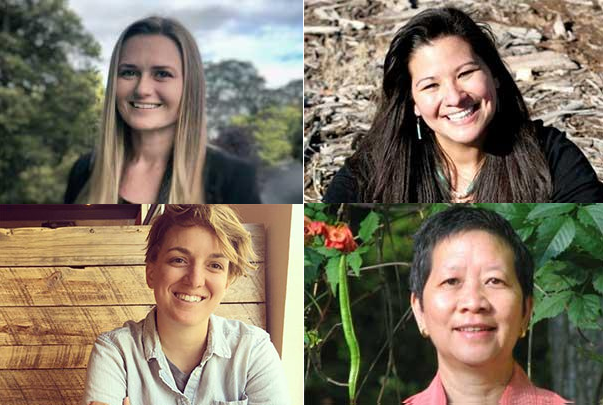In 2016 Sierra Club doubled down on our commitment to equity, inclusion and justice by creating a department to manage our own internal self-transformation into an anti-oppressive organization. As Director of Equity, Inclusion and Justice, I think it’s so important to share what we’re learning on our journey here at Sierra Club with the broader environmental movement, and the progressive community at large, so that our learnings can serve to help others navigate this challenging work. We learned a lot in 2016, our first year as a department, and my first as a director.

The Equity Department: Jessica Ronald, Cait Lull, Nellis Kennedy-Howard and Allison Chin
One big takeaway from 2016 was that it takes resources to do this work. We succeeded last year in large part because the Equity department now has access to meaningful financial resources and highly skilled and committed people, including two full-time staff, a departmental lead volunteer, and part-time support from other departments. Without these resources we wouldn’t have been able to make the progress we have. This is a big lesson for other organizations on a similar journey - you’ve got to invest real resources to make this work possible.
But recognizing that resources are and always will be scarce in non-profit work, we’ve also invested in building our volunteer capacity, as well as deepening our connections with leadership bodies within the Sierra Club, so that more people can become advocates for equity and justice within our organization and our movement.
At the same time, we realized this year that we can’t do it all. Being a small department with limited staff, we are unable to satisfy all the requests we receive for support, training and coaching. There is a hunger for education on equity issues that can’t be met without additional investments in training and coaching - stay tuned for news on that front for 2017!
Another challenge for us at Sierra Club is engaging the full spectrum of folks we have in our very large community. Our community includes folks who are just beginning their equity journey and are unsure of whether they fully support the organization’s commitment to advancing equity, as well as many who are seasoned advocates on equity related issues and impatient to see the organization move quickly to become an anti-racist and anti-oppressive organization. Of course there are also folks who are outright opposed to this work. In 2017 we will continue to confront the hard questions that arise when we ask every member of the Sierra Club community to grow and change with our organization.
In 2016 we also learned about a phenomena I call “dust storms.” Discussing sensitive issues and driving progress on our equity goals can cause conflict, which often leads to “dust storms” of fallout that require significant time to navigate within the organization. It’s not an easy thing to examine one’s own privilege, or confront the reality of white supremacy head on. The more work we do, the more dust storms we kick up. We are constantly working to balance and encourage organic engagement around equity work, while also navigating these dust storms.
While we learn and grow, we’re also looking to the future and attempting to tackle some very challenging questions that we don’t yet have consensus on within the organization. Questions like: What does it mean to become an anti-racist organization? And what systems of accountability need to be in place to support this type of commitment? How can Sierra Club best align our values for equity to our internal and external facing work? And how can we best play an impactful role in the broader progressive and environmental movement? We’ll continue to explore these questions as we move forward.
We learned a lot in 2016, and we’re already acting on these lessons in 2017. If you’re engaged in work in your community to lift up principles of equity, inclusion and justice, I’d love to hear from you in the comments about what lessons you’ve learned on your journey.